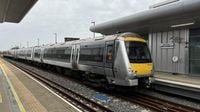On June 11, 2025, Chancellor Rachel Reeves unveiled a sweeping Spending Review that promises to reshape the UK's transport infrastructure, health services, and security landscape with unprecedented investment. Central to her announcement was a major boost to the rail network, particularly in Northern England and Wales, signaling a renewed commitment to undo a generation of underfunding and neglect that has long hampered regional connectivity and economic growth.
In a Commons speech, Reeves declared a £3.5 billion investment to upgrade the TransPennine route, a vital corridor linking Manchester and Leeds. This upgrade aims to slice journey times from 55 minutes down to just 41, with a quarter of the route expected to be electrified by summer 2025. But that’s just the beginning. The Chancellor promised to set out detailed plans in the coming weeks to revive the Northern Powerhouse Rail project, a high-speed rail network originally proposed in 2014 but later scrapped. This initiative is designed to better connect cities and towns across the North West and North East, fueling economic growth and regional regeneration.
One of the most eagerly anticipated elements of the Northern Powerhouse revival is the rumoured Liverpool-Manchester rail link. Currently, journeys between these two cities take between 45 and 55 minutes, with multiple stops. The new express line, which could be operational in the early 2030s, is expected to cut travel time by 20 minutes, making it significantly faster than today’s service. The proposed route would include just three stops: Manchester Airport, Warrington Bank Quay, and Liverpool Gateway, though the exact location of the Liverpool Gateway remains undecided. Both Liverpool Lime Street and Manchester Piccadilly stations are slated for major redevelopment to alleviate existing capacity bottlenecks and transform the surrounding areas into vibrant growth zones with up to 500,000 new homes planned along the corridor.
Greater Manchester Mayor Andy Burnham highlighted the historical significance of the new rail link, reminding that “just over 200 years ago, the world’s first passenger railway was built to connect Liverpool and Manchester, transforming the nation’s fortunes for centuries.” He emphasized that Victorian infrastructure is now a brake on growth, and that the new railway would punch “well above its weight” in boosting the UK economy and connecting high-growth sectors.
Alongside these northern ambitions, the Spending Review allocated £445 million over 10 years for rail upgrades in Wales, including plans for five new stations in Cardiff, Newport, and Monmouthshire, as well as enhancements in north Wales. This funding package is a response to years of complaints about underinvestment in Welsh rail infrastructure. Key projects include new stations at Cardiff East near Newport Road, west Newport, Somerton, Llanwern, and Magor & Undy, aimed at improving connectivity in areas currently reliant on the congested M4 motorway. Welsh Transport Secretary Ken Skates and other officials have been lobbying for these improvements, with hopes that the work will enable metro-style services on routes like Wrexham to Liverpool.
While the Welsh rail funding was welcomed by Labour figures as a historic investment, opposition politicians criticized the 10-year timeline as insufficient, calling it a “disgrace” and arguing the money should have been delivered sooner. However, government sources noted that spreading the investment over a decade was necessary to ensure the projects could be completed effectively without funds being returned unused.
Beyond regional rail, the Spending Review included a record £29 billion annual boost for the NHS, with £10 billion earmarked for technology and digital transformation. This investment aims to deliver millions more GP appointments, expand mental health support in schools, and provide an additional 700,000 urgent NHS dentist appointments each year. Reeves underscored the link between a strong economy and a strong NHS, stating: “There’s no strong economy without a strong NHS.”
Security also received a significant uplift, with an £11 billion real-terms increase in defence spending over the review period, including £15 billion for a nuclear sovereign warhead programme supporting over 9,000 UK jobs. Border security will see at least £280 million annually by 2028-29 to combat people-smuggling gangs, alongside at least £400 million per year to speed up asylum processing and end the costly use of migrant hotels by the next election.
Transport funding was extensive, with £15.6 billion allocated to local transport projects in England’s city regions by 2031-32 and £2.3 billion for improvements outside these regions between 2026-27 and 2029-30. The East-West Rail project connecting Oxford and Cambridge received £2.5 billion to continue its delivery, while the Midlands Rail Hub will progress with dedicated funding to enhance connections from Birmingham across the West Midlands and into Wales. Leeds station is set for a £240 million upgrade to expand capacity and relieve congestion, addressing growing passenger demand.
Meanwhile, the government confirmed a £25.3 billion funding package over four years to progress the High Speed 2 (HS2) project from Birmingham Curzon Street to London Euston. This funding aims to reset the programme under new leadership, tackling longstanding delivery challenges and rebuilding confidence in Britain’s largest infrastructure project.
London’s transport network will benefit from a £2 billion multi-year capital settlement between 2026-27 and 2029-30 to fund Transport for London’s capital renewals programme. However, the Chancellor faced criticism from London City Hall for not allocating funds to the Bakerloo line and Docklands Light Railway extensions, projects seen as vital for economic growth and affordable housing in the capital.
Additional investments include £24 billion for motorway and local road improvements between 2026-27 and 2029-30, £900 million to maintain and improve bus services with a £3 fare cap outside London extended until March 2027, and £616 million for walking and cycling infrastructure. The government also committed £1.4 billion to support electric vehicle uptake and £400 million to expand charging infrastructure, alongside £9.4 billion for UK carbon capture and storage initiatives.
On housing, the Spending Review confirmed a £39 billion investment over 10 years in a new Affordable Homes Programme, the largest boost in a generation, aimed at delivering 1.5 million new homes. This decade-long certainty is expected to turbocharge the government’s Plan for Change commitment to address the UK’s housing crisis.
Devolved nations received record real-terms settlements via the Barnett formula, with Scotland gaining an average extra £2.9 billion, Wales £1.6 billion, and Northern Ireland £1.2 billion over the Spending Review period. These funds aim to empower local governments to deliver on priorities that matter most to their communities.
Reeves’s Spending Review also included commitments to community regeneration, with funding for up to 350 communities, especially in deprived areas, through the Plans for Neighbourhoods initiative. This aims to support local councils in combating graffiti, fly-tipping, and enhancing public spaces like parks, community centres, and libraries.
Despite the ambitious spending plans, the Chancellor faced opposition from Conservative MPs and critics who warned that increased borrowing and tax hikes could burden the economy. Tory Shadow Chancellor Mel Stride described the Spending Review as a “spend now, tax later” fantasy. Yet Reeves defended her approach, emphasizing that these investments are necessary to renew Britain and support working people across the country.
As the government prepares to release its Infrastructure and Industrial Strategies in the coming weeks, all eyes will be on how these ambitious plans translate into tangible improvements for the UK's transport networks, public services, and communities.



